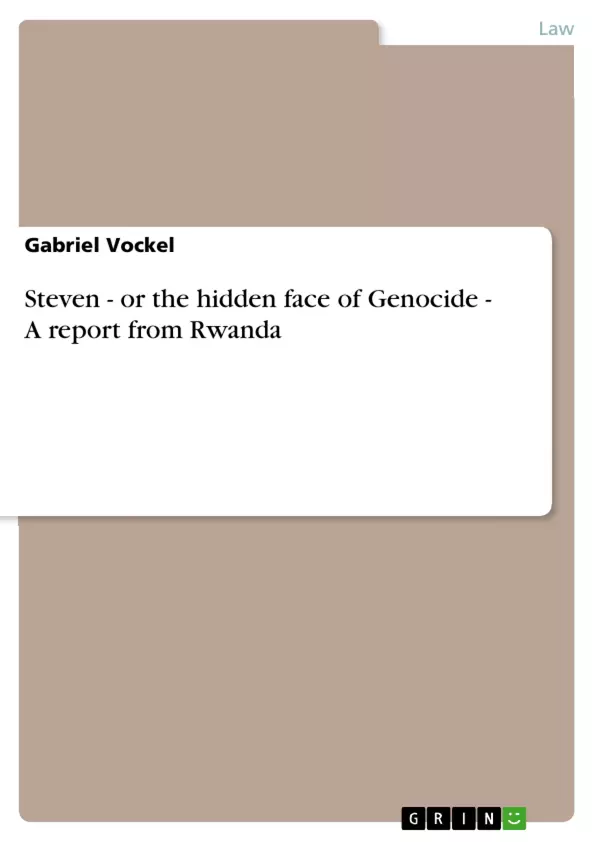I was on my way to a small village in the outskirts of down-town Kigali, where a traditional “Gacaca trial”, which has been introduced in every small conglomeration of the country, was taking place that day, in an attempt to deal with the almost 120.000 people who are still being held in prison in the aftermath of the genocide (at 2002). About a hundred meters down the road there was an open meadow on which a big, burned remains of a house was standing. In the courtyard of this house there were chairs, benches, tables as well as a big plan of the UN Refugee Organisation (UNHCR) that was providing a shade. At this time only a group of elderly men who made up part of the 19 traditional judges had arrived at the scene. I followed the three hour process itself with the help of a translator and friend, Emmanuel, a young Rwandan journalist. As the approximately 250 village inhabitants were taking leave at the end of the session, I was also thinking of parting, but at this moment one of the traditional judges, a rather friendly, tall and lean gentleman of about 45, came over to me. We took seats alone, as he spoke very good English and we did not need a translator, on a nearby bench a bit removed from the villagers who were still standing all around the place. In the meantime Emmanuel had caught company of an old friend, with whom he stood around the dilapidating door frames, just a stone throw away from us.
Inhaltsverzeichnis (Table of Contents)
- The Further Away the Bicycle Taxi Drove Me Along the Dilapidated Street Surrounded by Green Banana Plants and Out of Down Town Kigali, the More the Central African Countryside Became Apparent.
- I Was on My Way to a Small Village in the Outskirts of Down-Town Kigali, Where a Traditional "Gacaca Trial", Which Has Been Introduced in Every Small Conglomeration of the Country, Was Taking Place That Day, in an Attempt to Deal with the Almost 120.000 People Who Are Still Being Held in Prison in the Aftermath of the Genocide (at 2002).
- As the Approximately 250 Village Inhabitants Were Taking Leave at the End of the Session, I Was Also Thinking of Parting, but at This Moment One of the Traditional Judges, a Rather Friendly, Tall and Lean Gentleman of About 45, Came Over to Me.
Zielsetzung und Themenschwerpunkte (Objectives and Key Themes)
This report from Rwanda aims to provide a personal account of the aftermath of the 1994 genocide, focusing on the impact on individuals and communities. The report explores the legacy of violence, the ongoing process of reconciliation, and the challenges faced by survivors in rebuilding their lives.
- The lasting impact of the Rwandan genocide on individuals and communities.
- The role of traditional justice mechanisms, such as the Gacaca courts, in addressing the legacy of violence.
- The challenges of reconciliation and rebuilding in the aftermath of genocide.
- The importance of remembering and commemorating the victims of genocide.
- The responsibility of the international community to prevent future atrocities.
Zusammenfassung der Kapitel (Chapter Summaries)
- The report begins by describing the author's journey to a small village in Rwanda, where he witnesses the aftermath of the genocide. The author notes the stark contrast between the beauty of the Rwandan countryside and the horrific events that took place there.
- The author attends a Gacaca trial, a traditional justice mechanism used to address the vast number of genocide perpetrators. The author provides a detailed description of the trial process, highlighting the challenges and complexities of seeking justice in a post-genocide society.
- The author encounters a survivor named Steven, who shares his personal story of loss and resilience. Steven's account provides a powerful glimpse into the human cost of the genocide and the ongoing struggle to cope with the trauma of the past.
Schlüsselwörter (Keywords)
The report explores the themes of genocide, reconciliation, justice, trauma, memory, and the role of the international community. It examines the impact of the Rwandan genocide on individuals, communities, and the broader political landscape. Key terms include Gacaca courts, Rwandan Patriotic Front, Radio Television des Milles Collines (RTML), and the United Nations.
Frequently Asked Questions
What are Gacaca trials in Rwanda?
Gacaca trials are traditional community justice mechanisms introduced in Rwanda to deal with the vast number of people (around 120,000 in 2002) imprisoned following the 1994 genocide.
How do Gacaca trials function in small villages?
Trials are held in open spaces, often led by traditional judges chosen from the community, where villagers gather to witness and participate in the reconciliation process.
Who is Steven in the context of this report?
Steven is a survivor who shares his personal story of loss and resilience, representing the "hidden face of genocide" and the human cost of the violence.
What is the role of the international community in Rwanda's recovery?
The report highlights the presence of organizations like the UNHCR, which provided support and infrastructure during the aftermath of the tragedy.
What are the main challenges for reconciliation in Rwanda?
Challenges include addressing the massive legacy of violence, ensuring justice for victims, and helping survivors rebuild their lives amidst a traumatic past.
- Quote paper
- Master of Arts in Diplomacy, Law and Global Change Gabriel Vockel (Author), 2002, Steven - or the hidden face of Genocide - A report from Rwanda, Munich, GRIN Verlag, https://www.grin.com/document/66216



